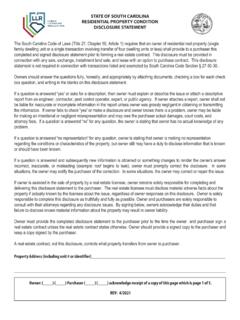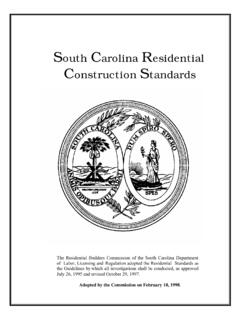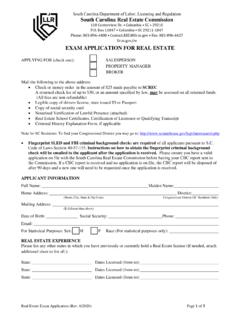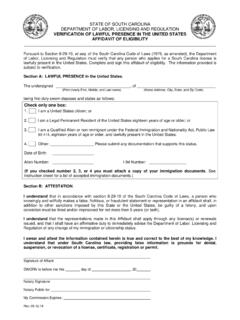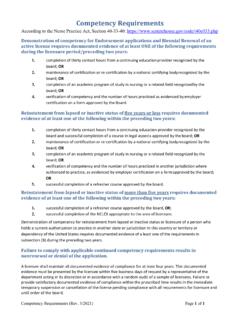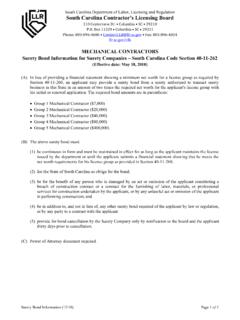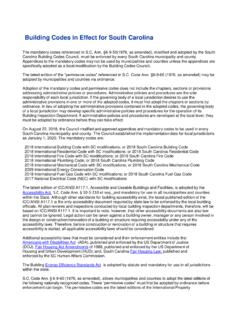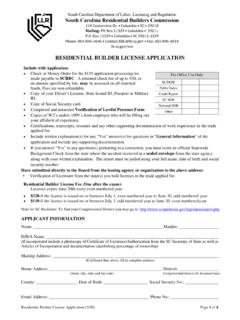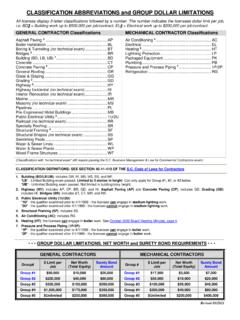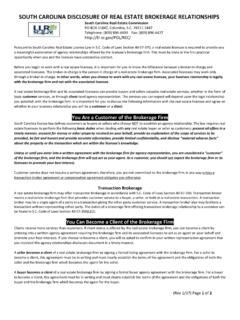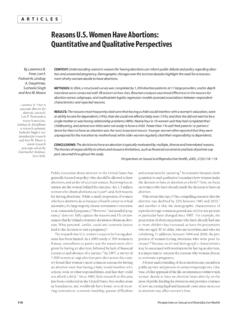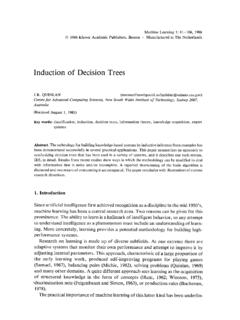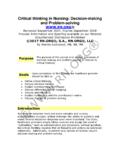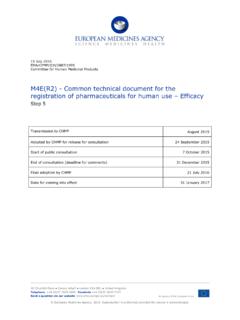Transcription of The South Carolina Scope of Practice Decision Tree
1 South Carolina Department of Labor, Licensing and Regulation South Carolina Board of Nursing Synergy Business Park Kingstree Building 110 Centerview Drive Columbia, SC 29210 Phone: 803-896-4300 1 The South Carolina Scope of Practice Decision Tree Interpreting Competency Based Practice Scopes The profession of nursing is a dynamic discipline. Practice potentials change and develop in response to the health care needs of society, technical advancements, and the expansion of scientific knowledge. All licensed nurses share a common base of responsibility and accountability defined as the Practice of nursing. However, competency based Practice scopes of individual nurses may vary according to the type of basic licensure preparation, Practice experiences, and professional development activities.
2 The parameters of the Practice scopes are defined by basic licensure preparation and advanced education. Within the Scope of Practice , all nurses should remain current and increase their expertise and skill in a variety of ways ( , Practice experience, in-service education, and continuing education). Practice responsibility, accountability, and relative levels of independence are also expanded in this way. The licensed nurse is responsible and accountable, both professionally and legally, for determining his/her personal Scope of nursing Practice . Since the role and responsibilities of nurses, and consequently the Scope of nursing Practice , is ever changing and increasing in complexity, it is important that the nurse makes decisions regarding his/her own Scope of Practice .
3 The South Carolina Board of Nursing has adopted the following Decision tree to assist nurses in interpreting the applicability of South Carolina s laws and regulations in Practice situations. If you have a Scope of nursing Practice question, follow each step of the Decision tree to resolve the question. If you are not able to answer your question after going through each step, consult your institution s or agency s nursing Practice committee. If the nursing Practice committee of your institution or agency cannot resolve the issue, the committee may submit a written request to the SC Board of Nursing s Administrator for an opinion from the Board s Nursing Practice and Standards Committee.
4 When submitting your question to the Practice and Standards Committee, please include documentation from the institution of agency committee discussions for each step of the Decision -making process noted below. 1. Describe the act to be performed. Describe what are you being asked to do? Are there written policies/ procedures available to describe how and under what circumstances you will perform this act? Does the new responsibility require professional judgment or simply the acquisition of a new skill? Is this a new expectation for APRNs? Has this been done before by others in your unit or health care facility? 2 Is it just new to you? What about the other facilities in your community or region?
5 What are the nurse manager s expectations about you or other nurses becoming responsible for this procedure? When will this become effective? Will there be an opportunity to help you attain the needed clinical competency? Who will be responsible for the initial supervision and evaluation of this newly performed task? Will you be given additional time to learn the skin if you need it? 2. Review the Scope of Practice for your licensure level. (The Nurse Practice Act and other S. C. Board of Nursing policies are available on the Board of Nursing s website at Nursing - Click on Laws/Policies) Advanced Practice Registered Nurse" or "APRN" means a registered nurse who is prepared for an advanced Practice registered nursing role by virtue of additional knowledge and skills gained through an advanced formal education program of nursing in a specialty area that is approved by the board.
6 The categories of APRN are nurse practitioner, certified nurse-midwife, clinical nurse specialist, and certified registered nurse anesthetist. An advanced Practice registered nurse shall hold a doctorate, a post-nursing master's certificate, or a minimum of a master's degree that includes advanced education composed of didactic and supervised clinical Practice in a specific area of advanced Practice registered nursing. APRNs must achieve national certification within two years post-graduation. An APRN may perform those activities considered to be the Practice of registered nursing or advanced Practice consisting of nonmedical acts, such as population health management; quality improvement or research projects within a health care system; and analysis of data and corresponding system recommendations, revisions, developments, or informatics.
7 An APRN also may perform specified medical acts pursuant to a Practice agreement as defined in item in the Nurse Practice Act, item 45 " Practice agreement" means a written agreement developed by an NP, CNM, or CNS and a physician or medical staff who agrees to work with and to support the NP, CNM, or CNS. The Practice agreement must establish the medical aspects of care to be provided by the NP, CNM, or CNS, including the prescribing of medications. The Practice agreement must contain mechanisms that allow the physician to ensure that quality of clinical care and patient safety is maintained in accordance with state and federal laws, as well as all applicable Board of Nursing and Board of Medical Examiners rules and regulations.
8 The Practice agreement must comply with Section 40-33-34. A CNM also may Practice pursuant to written policies and procedures for Practice developed and agreed to with a physician who is board certified or board eligible by the American College of Obstetricians and Gynecologists. Written policies and procedures constitute a Practice agreement for purposes of compliance with Section 40-33-34 and must address medical aspects of care including prescriptive authority and must contain transfer policies and details of the on-call agreement with the physician with whom the policies and procedures were developed and agreed. The on-call physician has the authority to designate another qualified physician to be the on-call physician if necessary.
9 The on-call 3 physician must be available to the CNM to provide medical assistance in person, by telecommunications, or by other electronic means. Practice includes but is not limited to: assessing clients, synthesizing and analyzing data, understanding and applying principles at an advanced level; providing expert teaching and guidance; working effectively with clients, families and members of the health care team; managing clients physical and psycho-social health status; utilizing research skills; analyzing multiple sources of data; identifying alternative possibilities to health care problems and selecting appropriate treatment; making independent decisions in solving complex Client problems; performing acts of diagnosing, prescribing, Administering and dispensing therapeutic measures.
10 Recognizing limits of knowledge; and consulting with or referring to other health care providers as appropriate. 3. Is the act expressly permitted or prohibited by the Nurse Practice Act for the licensure that you hold? (The Nurse Practice Act is available on the Board of Nursing s Website at - Click on Laws/ Policies) Unsure Go to #4. Permitted . Go to #5. Prohibited Stop! The act is not within your Scope of Practice . 4. Is the act consistent with your Scope of nursing Practice based on all of the following? Education taught in basic nursing education programs or through attainment of additional competencies. Established policies and procedures in the employing organization or facility.
